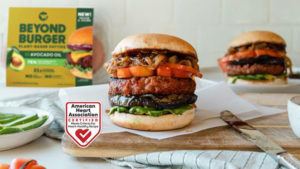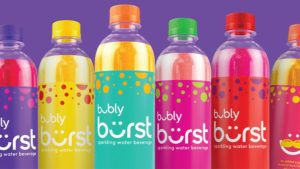While the plant-based trend certainly has remained strong, in spite of meat analog companies going through some natural setbacks, there’s a factor that some believe is getting lost in the category: Plant-based is not all about creating replications of animal-based meat and dairy. The latest plant-based product development is keeping produce front and center, without having it disappear into unidentifiable forms.
“Brands that closely mimic animal-based products do currently make up the majority of the plant-based category,” says Linette Kwon, data analyst for the Plant Based Foods Association. “However, based on the continued prominence of health as a key motivator—and the fact that consumers are demanding more variety—we expect to see more plant-forward options entering the market in 2024.”
While it’s true that the development and acceptance of meat and dairy analogs catalyzed the explosion in the plant-based movement, substitutes that show off their produce—such as vegetable patties from legumes, mushrooms, cauliflower, and root vegetables—are having a much-deserved renaissance. Also, vegetarian sides and snacks are increasingly popular.
More than that, the use of plant-based ingredients is on the rise. For example, the smallest and most sustainable plant, microalgae, is once again being processed into ingredients that fill in for certain formulation fundamentals. “2024 will be focused on whole foods for plant-based, such as mushrooms, walnuts, legumes, etc.,” predicts Cathy Strange, Ambassador of Food Culture for Whole Foods Market, Inc. and member of the Trends Council. A recent Mintel study revealed that 63% of US consumers “would like to see more plant-based meat alternatives made with whole vegetables.”
Veggies First
An example of the power of consumer demand, and acceptance, for more vegetable-centered products is Caulipower, LLC. The makers of cauliflower-based pizzas, pastas, and other foods leaped from inception to nine-figure annual sales in just half a dozen years. The company ignited a flood of others that chose to follow the path of using vegetables as a primary ingredient without trying to mimic meat or dairy.
One participant in the plant-based movement is Down to Cook, Inc.’s Adda Veggie. The company produces a line of clean-label dry mixes designed to help consumers produce quick, healthy, plant-based meals. These include cauliflower kathi rolls (an Indian-style wrap), chipotle mushroom tacos, and eggplant Bolognese.
“The insight of using real vegetables came from my personal experience behind the scenes in the plant-based movement,” says Trishna Saigal, company founder. “Prior to creating Adda Veggie, I worked on plant-based products that were all the craze and saw just how unhealthy and processed they seemed. I personally value health above all in food products and while formulating my ideas for what ended up becoming Adda Veggie, focusing on what it really means to eat healthy, plant-based foods.”
The four different dry mixes contain added pea protein and prebiotic fiber. They’re available in Original Herb Blend, Herby Garlic, Chipotle Adobo, and Indian Masala flavors.
Forget Avocado Toast
One company keeping it green is Anthony & Sons Bakery, Inc. The company recently developed a “better for you bread” made with fresh avocado. “Consumers today are increasingly health-conscious and value products that are both flavorful and nutritious,” says Baldo Dattolo, president and CEO. “With The Avocado Bread Company [branding], we set out to deliver a unique, yet beneficial product that capitalized on the avocado food trend. Our Avocado Seeds & Grains bread offers consumers a healthier bread product that utilizes avocado, oats, sunflower seeds, and cracked wheat.”
Explore More
Vegetables as Meat Replacers—Not Analogs—Find Their Way Back to Center Plate
A Prepared Foods' interview with Susan Guerin, CEO of World Finer Foods, Inc. and Cutting Vedge, Inc.
“One challenge we faced while perfecting our Avocado Seeds & Grains bread recipe was the mild flavor of avocados,” admits Dattolo. “We wanted customers to recognize the use of avocados, and to provide a flavor profile unlike any other brand on the market. With this in mind, we developed a recipe inspired by one of the most recognizable avocado-based products: guacamole.”
The company’s bakers opted for a blend of avocado and guacamole spices to create a one-of-a-kind flavor profile. To further enhance the health benefits of the fresh avocados, they incorporate a variety of nutrient-dense seeds and grains. The result is a toothsome bread with a tender interior and an eye-catching green hue that lends itself perfectly to sandwiches—and, of course, to avocado toast.
Leader of the Plant
Among the crush of plant-forward companies, Amy’s Kitchen, Inc. is ahead of the pack, developing its first whole food, plant-based frozen meals nearly 40 years ago. “Since our inception in 1987, we’ve used only the highest quality, organic plant-based ingredient,” says Ritu Mathur, company vice president. “In 1989, we began our search for the perfect veggie burger. We tried recipe after recipe for our California Veggie Burger.” Finally, the founders settled on the burger they are still selling today, made with real ingredients: mushrooms, bulgur wheat, walnuts, carrots, celery, and onions.”
Today, Amy’s offers three veggie burgers, the California Burger; Black Bean Veggie Burger, made with sweet potato, green chili peppers, and corn; and its gluten-free Sonoma Veggie Burger, made with quinoa, mushrooms, carrots, potato, and garbanzo bean flour.
One of Amy’s biggest challenges was coming up with a combination of vegetables that not only hit the desired flavor goals but could also froze well. “Most vegetables can be frozen, but vegetables with a lower water content freeze best,” explains Mathur. The company found that peppers, sweet potatoes, carrots, mushrooms, and corn fared best when frozen, compared to tomatoes and zucchini.
Green on Green
In addition to the health benefits, there are environmental benefits to eating more produce. A typical veggie burger has a greenhouse-gas footprint of only 9% of that of a beef burger. In addition, vegetables require about half the arable land than does raising beef cattle. That’s important not only in regard to climate change but also for biodiversity, responsible water use, and the protection of natural habitats.
The shift to increased use of plants as the primary source of nutrition is largely consumer driven. “More and more people are increasingly wary of highly processed foods and are seeking alternatives that they perceive as more natural,” says Strange. Whether discussing the latest trends in the plant-based arena, or the tried-and-true products enjoyed for generations, vegetables and fruits are finally getting the center-of-the-plate attention they deserve.
Just Add Fruit
One recent plant-based launch arrived on the heels of an April Fools’ joke. “We announced we were launching blueberry burgers and they were so well received, we turned the joke into reality,” says Cassi Lubarsky, of Actual Veggies, Inc. The company, which specializes in burgers made from fresh beets, carrots, sweet potato and broccoli, now offers two fruit and vegetable breakfast burgers: Blue Breakfast Burger (made with the aforementioned blueberries plus bananas, açai, and cauliflower) and Pink Breakfast Burger (made with strawberries, dragon fruit, bananas, and red lentils).
“We thought this was a perfect addition to our lineup of products because we created burgers you could eat throughout the day,” adds Lubarsky. “It was incredible to watch an April Fools’ joke turn into a real product.” That said, the company faced some obstacles when trying to get its new product ready for market. “Because the ingredients we were using for this product are so different in texture and flavor from our veggie burgers, we brought in a new chef to help bring the concept to the finish line. We went through around fifty different iterations of the product to get it where it is today.”
Microplant, Macronutrition
A unique innovation in plant-based ingredients is algae-derived cooking oil, a flavorless culinary oil with an unusually high smoke point of 485°F. Algae oil packs a nutritional punch of 13g of monounsaturated fat per tablespoon—about 25% more of the beneficial lipid than olive oil and avocado oil. It also is the most eco-friendly, leaving one of the smallest carbon footprints of any other oil. Compared to olive oil, algae requires 238 times less water, seven times less land use, and creates 56% fewer greenhouse gas emissions.
While healthful omega oils are typically associated with fish and other aquatic animals, they’re not the true source. Rather, they get their omegas from the algae they consume. The latest market launch of algae oil comes from a microalgae species originally discovered in the sap of a chestnut tree in Germany. This particular microalgae likes to convert plant-based sugars into oil through a natural fermentation process. This natural precision fermentation process has been converted to work in closed tanks.
Once the microalgae have converted enough product, the algae oil is expeller pressed. No solvents are used in the process. Unlike previous iterations that hindered cost-effective production, a circular production process is now used. The feedstock used to ferment with the microalgae is renewable cane sugar responsibly grown in an agro-ecological zone, and the production facility is located next to the sugar mill. Once the sugar is extracted from the cane, the leftover biomass is used to generate energy that powers both the algae oil production facility and the sugar mill.”
Algae oil offers consumers an environmentally friendly and highly nutritious option for a variety of cooking and baking applications.







